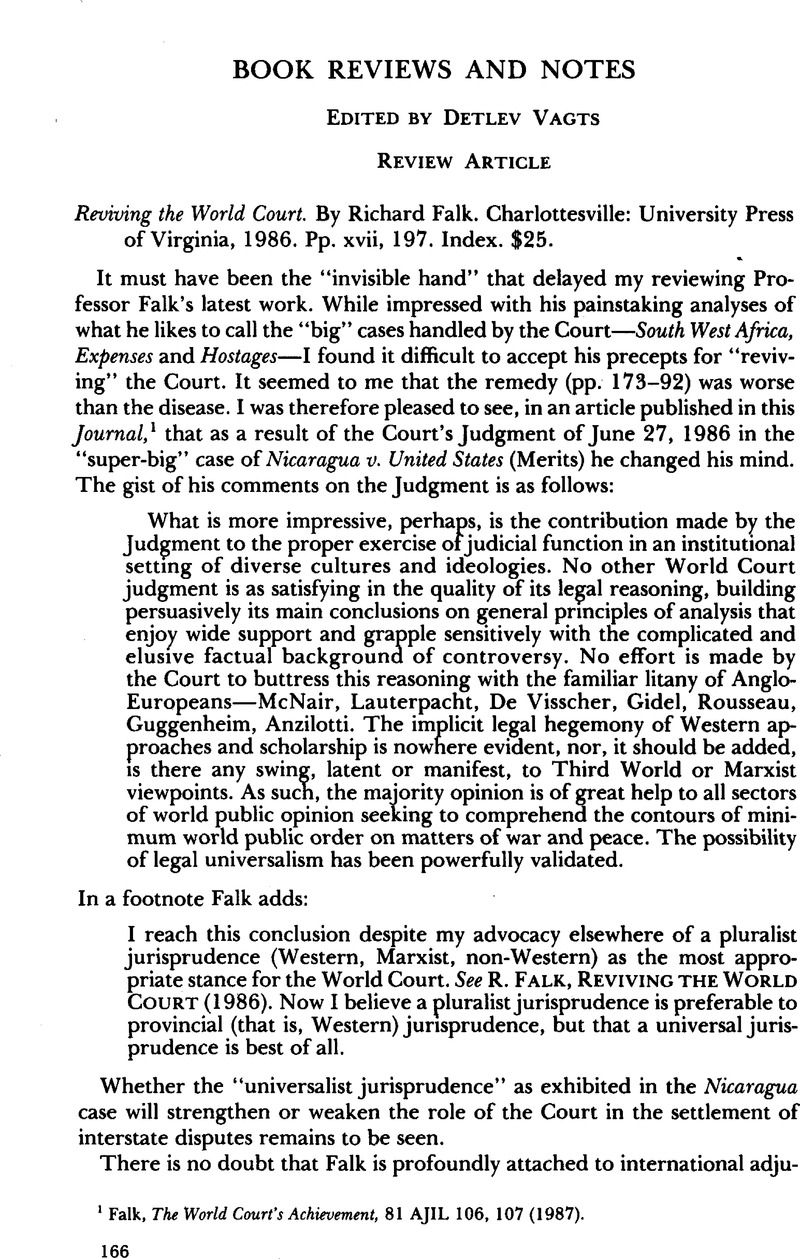Published online by Cambridge University Press: 27 February 2017

1 Falk, The World Court’s Achievement, 81 AJIL 106, 107 (1987)Google Scholar.
2 The statement is from Franck, T. The Structure of Impartiality 46 (1968)Google Scholar.
3 See Falk, p. 13, and Gross, Underutilization of the International Court of Justice, 27 Harv. Int’l L.J. 571 (1986)Google Scholar.
4 South West Africa Cases (Ethiopia v. S. Air.; Liberia v. S. Afr.), Preliminary Objections, 1962 ICJ Rep. 319, 347 (Judgment of Dec. 21).
5 Id. at 455 (Winiarski, J., dissenting).
6 He refers to her book, The Latent Power of Culture and the International Judge (1979). Her original work in German (Der Internationale Richter im Spannungsfeld der Rechtskulturen) (1975) was reviewed by Paul Reuter in this Journal at 70 AJIL 893 (1976).
7 See in this connection Prott, The Judicial Philosophy of Manfred Lachs, in Essays in International Law in Honour of Judge Manfred Lachs 423–47 (J. Makarczyk ed. 1984). At the time of her writing, Lachs had served 15 years on the Court and had taken part in 22 major judicial pronouncements (id. at 423).
8 Legal Consequences for States of the Continued Presence of South Africa in Namibia (South West Africa) notwithstanding Security Council Resolution 276 (1970), 1971 ICJ Rep. 16, 51 (Advisory Opinion of June 21).
9 Reparation for Injuries Suffered in the Service of the United Nations, 1949 ICJ Rep. 174, 182 (Advisory Opinion of Apr. 11).
10 Interpretation of Peace Treaties, 1950 ICJ Rep. 65, 71 (Advisory Opinion of Mar. 30) (emphasis supplied). The opinion was not unanimous: see Separate Opinion of Judge Azevedo, id. at 79, 81, 82, 88; and the Dissenting Opinions of Judge Winiarski, 1950 ICJ Rep. at 89, 96, 97, and of Judge Krylov, 1950 ICJ Rep. at 105, 106, 109. Falk refers to this opinion in a different context (p. 160).
11 It did not refer to the Peace Treaties case eo nomine but to two opinions that indirectly refer to it. It recalled in 1971 ICJ Rep. at 24, para. 32, the Advisory Opinion on Reservations to the Genocide Convention, 1951 ICJ Rep. 15, 19; and in 1971 ICJ Rep. at 27, para. 41, it cited its Advisory Opinion on the Constitution of the Maritime Safety Committee of the Inter-Governmental Maritime Consultative Organization, 1960 ICJ Rep. 150, 153. Here the Court noted that some statements submitted to it linked the question put to it with political matters and declared, “The Court as a judicial body is however bound, in the exercise of its advisory ‘ function, to remain faithful to the requirements of its judicial character.” Id.
12 Western Sahara, 1975 ICJ Rep. 12, 21 (Advisory Opinion of Oct. 16). It also referred to the cases cited in note 11 supra.
13 “Global” seems to be a code word for “Third World.”
14 This chapter was written in collaboration with Jack Sanderson.
15 In Nicaragua v. United States, Nicaragua was represented by “non-Marxist, if not anti- Marxist” lawyers: Abram Chayes and Paul Reichler, who graduated from Harvard Law School (p. xvi). In the earlier 1962 South West Africa case, Liberia, and later, in the 1966 phase of the case, Ethiopia, were represented by Ernest A. Gross, a graduate of Harvard Law School. Falk was, during 1965, a member of the Gross team. He was struck
by the odd spectacle of white American lawyers representing this preeminently black, Third World cause—not only by the racial disjunction, but also by entrusting the direction of such litigation to a prominent American diplomat/lawyer, who, while personally abhorring apartheid, was still closely identified with one of the two governments in the world (the United States and the United Kingdom) with the most to lose by the collapse of the status quo in southern Africa [pp. x-xi].
It may be noted that Falk is not a graduate of Harvard Law School but of the supposedly policy-oriented Yale Law School.